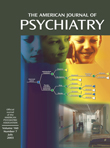Change Diagnosis to “Alcohol Withdrawal Delirium”?
To the Editor: In 1980 APA replaced the DSM-III diagnosis “delirium tremens” with “alcohol withdrawal delirium.” In the following, I describe a study that stemmed from the concern that not only can the term “alcohol withdrawal delirium” be easily confused with “alcohol withdrawal” but the diagnosis “alcohol withdrawal delirium” in general medicine is used indiscriminately, such that other potentially important underlying causes for delirium are often overlooked.
Fifty patient charts from the University of New Mexico Hospital with a discharge diagnosis of “alcohol withdrawal delirium” were randomly selected by a medical records computer for 1994, 1996, and 1998 and were reviewed by me (director of the Psychiatric Consultation and Liaison Service), a trained research assistant, and a medical intern. Data were obtained regarding diagnosis, mental status observations, nursing notes, drinking history from the patient and his or her family, and presence of major medical and surgical problems. A retrospective diagnosis was made by consensus of the two senior clinicians.
The patients were 47 men and three women with a mean age of 42 years (range=29–75). Most (N=34) were treated in medical units, 13 were in surgical units, and three were in the neurology service. They had a mean length of stay of 9.8 days (range=1–83.) The history of recent drinking for three patients was none. Their retrospective diagnoses included 20 with delirium tremens, six with acute intoxication, four with alcohol withdrawal, two with seizures without delirium, and one with alcohol hallucinosis=1. The remaining 17 patients met our criteria for “multifactorial delirium in chronic alcoholics”; that is, these patients with delirium also had serious medical and surgical problems, especially traumatic injuries, which were more extensive than those ordinarily seen in patients with delirium tremens. There were two deaths; both patients were retrospectively diagnosed as having multifactorial delirium.
The 13 patients without delirium (26.0%) obviously represented considerable diagnostic error. The 17 patients with multifactorial delirium (34.0%) had longer lengths of stay, with a mean stay of 17.5 days, compared to 5.3 days for the patients with delirium tremens. Fourteen of the 20 patients retrospectively diagnosed as having delirium tremens had episodes occurring during a drinking binge, compared to six patients who had episodes occurring during withdrawal.
A history of alcohol abuse influences the diagnosis of patients with delirium, no matter how medically complicated it is. Some of the difficulties may result from diagnostic terminology. I hope this report, despite the well-known problems of chart review, will stimulate interested clinicians to undertake similar retrospective and prospective studies and alert the current DSM-V committee to consider changing the term “alcohol withdrawal delirium” to “delirium tremens” and to consider introducing a new diagnostic term: “multifactorial delirium in chronic alcoholics.”
[Dr. Rosenbaum died May 20, 2003.]



